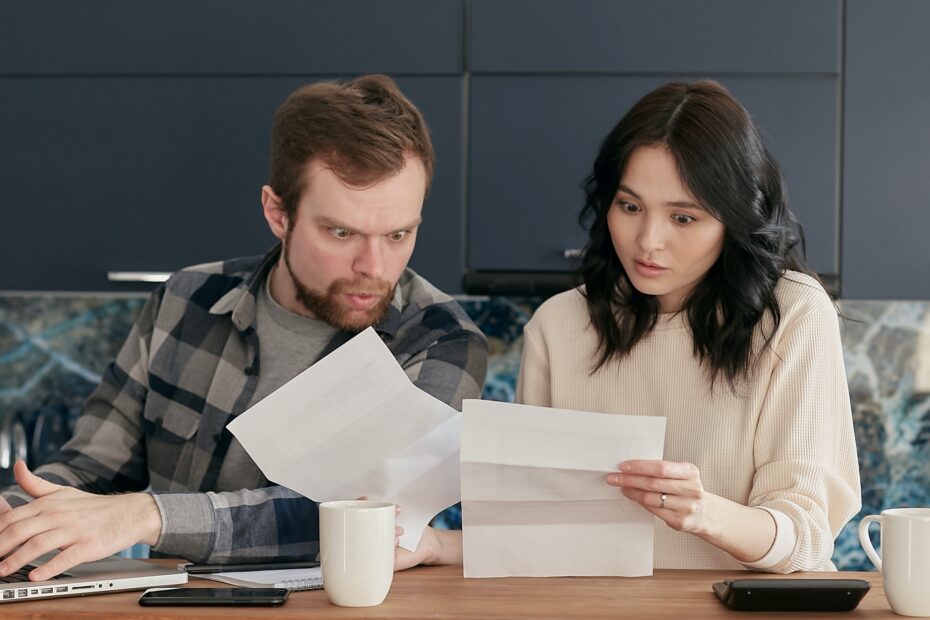What bills should I be paying? –
What we're covering..
Introduction 👋
Being a grown-up can be expensive!
There are lots of bills that grown-ups have to pay, and it can be difficult to keep on top of them!
Knowing what bills you need to pay is important to keep on top of your finances.
Here are our top 10 bills that adults need to remember to pay…
Disclaimer: This website provides information for guidance and educational purposes only. The Grown-Up School does not provide regulated financial advice. You can seek independent financial advice from a suitably qualified and regulated professional advisor. Check out our disclaimer policy for more information.
1. House Costs – Rent/Mortgage 🏡
These are payments that keep the roof over your head. Depending on whether you own the home, you could pay:
Rent (If you don’t own the home)
Rent is where you pay to use a flat/apartment or a house that somebody else owns.
If you rent a place to live, you are known as a “tenant”, and the person you’re renting off is called your “landlord”.
Very often a landlord will pay a business called a “letting agent” to manage the home and collect your rent money off you.
Learn more about renting here:
Mortgage (If you’ve borrowed money to buy a home)
A mortgage is where a person borrows money to buy a home or land.
You can learn more about mortgages here:
For some homes like flats/apartments, you have to pay regular additional fees such as:
- Ground rent
- Service charges
To get estimates on how much rent or mortgages costs in your area, you can check these websites:
- Zoopla (UK) https://www.zoopla.co.uk
- Zillow (USA) https://www.zillow.com
2. Council Tax (UK)/Property Tax (USA) 💰
These are payments that you make to the government.
Council Tax/Property Tax helps to pay for local services in the community like:
- law enforcement,
- fire protection,
- education,
- libraries,
- and road/highway construction.
The amount of property tax you have to pay depends on the area that you live in and the house that you live in.
You can find out estimated property/council tax costs for your area here –
- England/Wales UK – https://www.gov.uk/council-tax-bands
- Scotland UK – https://www.saa.gov.uk/
3. Electricity and Gas 💡🔥
Gas and electricity can supply your home with power and heating.
How much money you pay for gas and electricity depends on how much you use, and what supplier you’re with.
If you’re in the UK, you can switch your home’s gas and electricity suppliers to save money.
If you’re in the USA, your energy supplier options depend on what state you live in.
Some states have a default energy supplier which you cannot change from.
If you live in the UK, you can compare electricity and gas supplier prices here –
UK – https://www.moneysupermarket.com/gas-and-electricity/
4. Water Bills 🚿🚽
In the UK each area has its own water supplier.
You can find out who supplies your water here- https://www.water.org.uk/advice-for-customers/find-your-supplier/
You can’t change water supplier to save money in the UK, however you can decide whether or not to have a water meter installed to save money.
Installing a water meter means that you only pay for water that you use, which can be cheaper for families who use less water. Installing a water meter might be more expensive for families who use a lot of water.
Most people in the USA receive their water from water companies run by the government, although some receive water from private companies.
You can find a list of water companies in the USA here – https://en.wikipedia.org/wiki/List_of_United_States_water_companies/
5. Legal Bills – Court Fines, Child Maintenance, Alimony 👩⚖️
It’s very common to have legal bills to pay like:
Court Fines/Legal fees 🧾
If you’ve been convicted of a crime or been involved in a legal issue, you may have to pay court fines or legal fees.
Court fines are the punishment that a court puts on someone who has been convicted of a crime.
The court fines are usually paid to the government to compensate for any harm that the crime may have caused.
Court fines can be imposed as an alternative to imprisonment – they are typically only imposed for minor crimes like parking violations, traffic violations, and causing issues in public.
It is important to pay your court fines/legal fees because it will help you avoid having to pay more legal fees and penalties in the future.
Child Maintenance 🍼
Child maintenance payments are an arrangement between parents to make sure that their children are cared for.
They are a form of child support that is set in place by a court or by agreement between parents.
They are usually paid by one parent to the other, and they can be used to pay for things like food, clothes, school fees, and other costs. Child maintenance payments can also be used as a form of punishment if one parent has been abusive or neglectful towards their child.
It is important to pay child maintenance bills because it is a way of showing commitment to the child and the family. It’s also a way of ensuring that your children have a comfortable life.
Alimony Payments 💍
If you’ve been married and have gone through a divorce, you may have to pay alimony to your previous partner.
Alimony is a form of financial support that one person pays to the other after a divorce.
Alimony payments are usually awarded to the person who needs it more and is not able to provide for themselves.
It’s usually awarded in the form of monthly payments, but it can also be awarded as one lump sum payment or in other ways.
It’s important to pay alimony payments because it helps maintain the standard of living for your previous partner. It also might help them pay for child care and medical costs.
6. Insurance 📜
Getting insurance is where you pay money to “protect yourself” from different emergencies. If you find yourself in the emergency, you will often be given emergency money to help you. You can pay for insurance to help you in situations like:
- Your phone breaking (mobile phone insurance) 📱
- Pets getting sick (pet insurance) 🐶
- Your car getting stolen (car insurance) 🚗
- A house fire damaging your building (buildings home insurance) 🔥
- Flooding damaging your belongings at home (contents home insurance) 💦
- Losing your income because you’ve become ill/disabled (income protection) 💼
- You or your partner passing away (life insurance) 🥀
- You getting a critical illness (critical illness cover) 🤒
- Having troubles on holiday like getting burgled (travel insurance) ✈️
- Getting ill (health insurance) 🏥
If these emergencies happen you can get paid a sum of emergency money when you have insurance cover in place.
7. TV, Internet/Broadband, Entertainment, and Phone 📱
TV Licence 📺
A TV licence is a legal requirement in the United Kingdom. It’s a fee that you must pay if you watch or record television programmes as they are being shown on TV.
The BBC, ITV, Channel 4 and Channel 5 all need to be paid for by those who watch them. The TV licence is one of the ways the BBC gets its money to continue broadcasting programmes that we love.
Internet/Broadband 📡
This could include things like:
- Cost for your internet connection/Wi-Fi
Entertainment 🤹♀️
This could include things like:
- Netflix
- Amazon Prime
- Disney Plus
- Newspaper subscriptions
- Game subscriptions
Phone costs 📱
This could include things like:
- Your mobile phone contract
- Landline phones connected to your home
8. Transport-Related 🚗
This could include things like:
Car costs 🚗
- Car insurance – to cover costs of damage to your car
- Vehicle tax (UK) – Drivers must pay car tax to the government. This money pays for things like road work and maintenance.
- MOT Certificate (Ministry of Transport – UK) – this a a safety test that most cars need to pass every year.
- Fuel – petrol/diesel/electricity to keep your car running
- Parking charges – If you’ve gotten a parking ticket
- Car repairs
- Car loan/hire purchase – if you borrow money to buy your car
Other transport 🚅
- Season travel tickets
- Train/bus/taxi subscriptions
9. Loan Repayments 💸
Borrowing money can be risky, so it’s really important to know what you’re doing when you make the decision to borrow.
There can be a lot of risks from borrowing money – so you need to research them thoroughly before agreeing to borrow.
You can look for independent, regulated financial advice to help you to decide if borrowing is right for you (The Grown-Up School does not provide this!).
Different types of loans that people might have to pay back each month include:
Overdraft 🏦
An overdraft lets you borrow extra money through your bank account when it is empty.
For example, you have no money in your account but the bank lets you spend £15, so your bank balance would be -£15.
It is important to be very careful when using overdrafts to borrow money.
Personal Loans 💰
A personal loan is money that you borrow from a bank or other lender. You then pay the loan back regularly. You can usually borrow more money with a personal loan than a credit card.
It is important to be very careful when using personal loans to borrow money.
Buy Now Pay Later 🛋️
Buy now pay later schemes let people buy something without having to pay for it until a later date. You might be given from up to 30 days or even to up to 12 months to pay it back.
It is important to be very careful when using Buy Now pay Later schemes to borrow money.
Home Credit/Doorstep loans 🏠
Doorstep loans are a type of personal loan where the lenders visit your house to deliver the money and to collect repayments.
It is important to be very careful when using doorstep loans to borrow money.
Credit Card 💳
Credit cards are plastic cards that banks offer you, to help you borrow money to buy things.
When you use a credit card, you are borrowing money. Usually you have to repay this money regularly (every month) until the loan is paid off.
It is important to be very careful when using credit cards to borrow money.
Hire Purchase – Car, Furniture, Appliances 🚗
Hire purchase is where you pay part of the cost of something expensive e.g. a car or furniture, then pay the rest in regular installments. You “hire” the item until it is fully paid off.
It is important to be very careful when using hire purchase to borrow money.
10. Tax Returns 📜
A tax return is where you report your tax situation to the government. They are usually completed every year.
In your tax return you provide the government with information about how much money you earn, money you’ve spent, and how much tax you owe or have paid.
It’s important to pay your taxes because they help pay for really important public services, like education and roads. If you don’t file your taxes or report the correct information, you might face consequences like fines or jail time.
In the UK people who are self-employed usually have to complete tax returns.
If you’re employed by a business, you might be set up on the PAYE (Pay As You Earn) scheme, where your employer calculates and sends your tax money to the government for you. This means you might not have to file a tax return- yay!
Conclusion 👍
So that’s it!
The main bills that people have to pay are:
- House Costs – Rent/Mortgage
- Council Tax (UK)/Property Tax (USA)
- Electricity and Gas
- Water Bills
- Legal Bills – Court Fines, Child Maintenance, Alimony
- Insurance
- TV, Internet/Broadband, Entertainment, and Phone
- Transport-Related
- Loan Repayments
- Tax Returns
Hopefully you’re feeling more confident about paying bills.
If you know any friends or family members who might benefit from learning about paying bills, share this post with them!
Finally, don’t forget to check out our similar articles below!
Similar articles to “What bills should I be paying?” ⬇️
How to start looking after your money 🌱
8 reasons to start saving money now 🐷
Why you need to start thinking (and talking) about money💸
Is borrowing money a bad thing? 🤷♀️
How to keep control of your money 💸
🎓
Follow us!
for free daily Grown-Up lessons 🙌🎉



